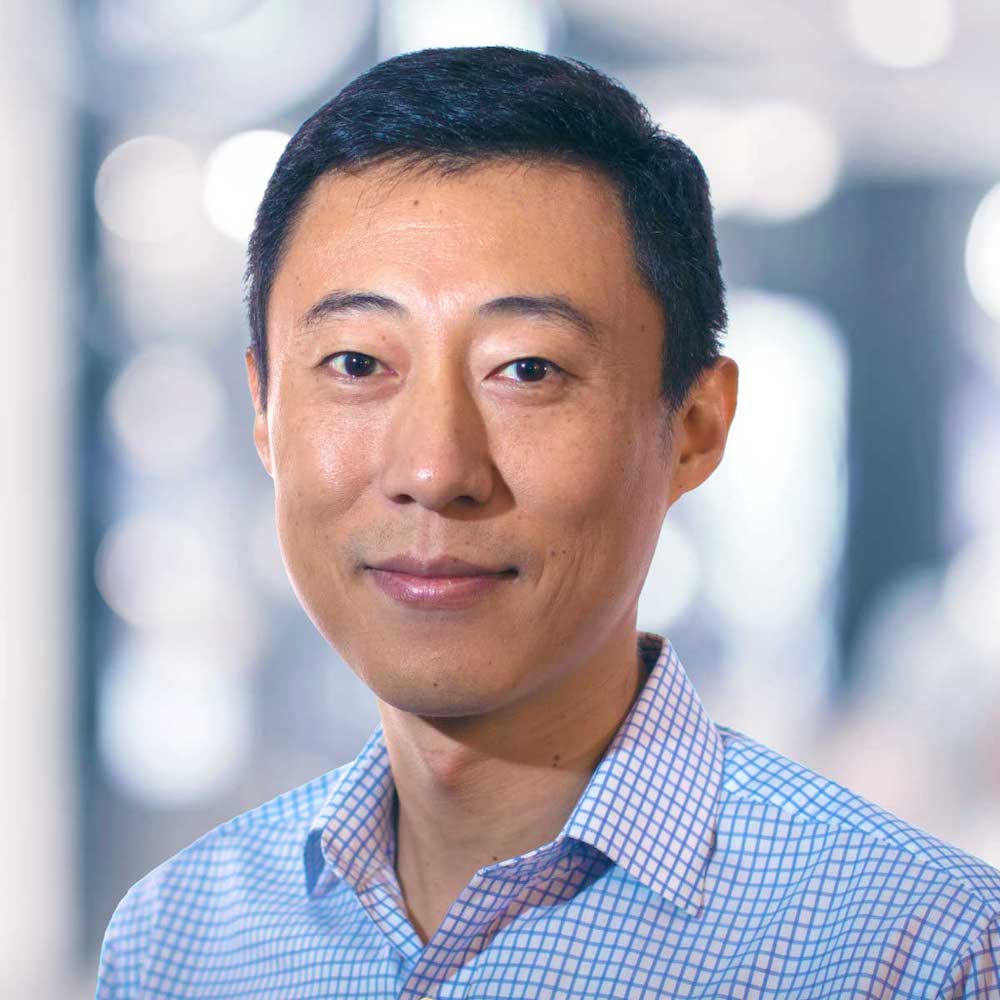Building on a legacy of impact: tech at the core of society
In 2019 and 2020, issues and inequalities that remained overlooked for too long were thrust into the spotlight in a way that was impossible to ignore. The COVID-19 pandemic highlighted the fragility of health systems, and the dangers facing frontline workers who prop up many economies unnoticed. The impacts of climate change were evident in a record number of weather-related disasters (1). Protests in the United States triggered by police killings of people of color quickly morphed into a global movement that gave voice to grievances amassed over centuries of racial injustice. Within countries and globally, wealth and political polarization hit new extremes.
As technology becomes more ubiquitous, it both contributes to these challenges and offers powerful potential solutions. As technologists, we believe we have a responsibility to constantly and critically assess technology’s impact on society, particularly on the marginalized and underserved, and to ensure that it is ultimately contributing to a more equitable future.
Working at the forefront of technology and social change requires grappling with complex questions, and a tolerance for failure. This report will outline the principles and tools that anchor us in this effort, explore examples from over the last two years of how we’ve translated them into action, and outline how we intend to build on this legacy going forward.

As technology moves more into the core of society we believe the tech sector has an extremely important role to play in shaping the future. It’s vital we consider the impacts of the work we do as technologists, through a lens of ethics, equity and inclusion – and continually ask how we want the world to be.
As technology moves more into the core of society we believe the tech sector has an extremely important role to play in shaping the future. It’s vital we consider the impacts of the work we do as technologists, through a lens of ethics, equity and inclusion – and continually ask how we want the world to be.
Our lenses
We work tirelessly, at times invisibly, on behalf of those on the front lines of the fight against climate change, health or social inequities. They understand these struggles and complex issues better than us, and our role is to provide the technology infrastructure and skills that enable them to succeed, rather than imposing ready-made solutions from the sidelines.

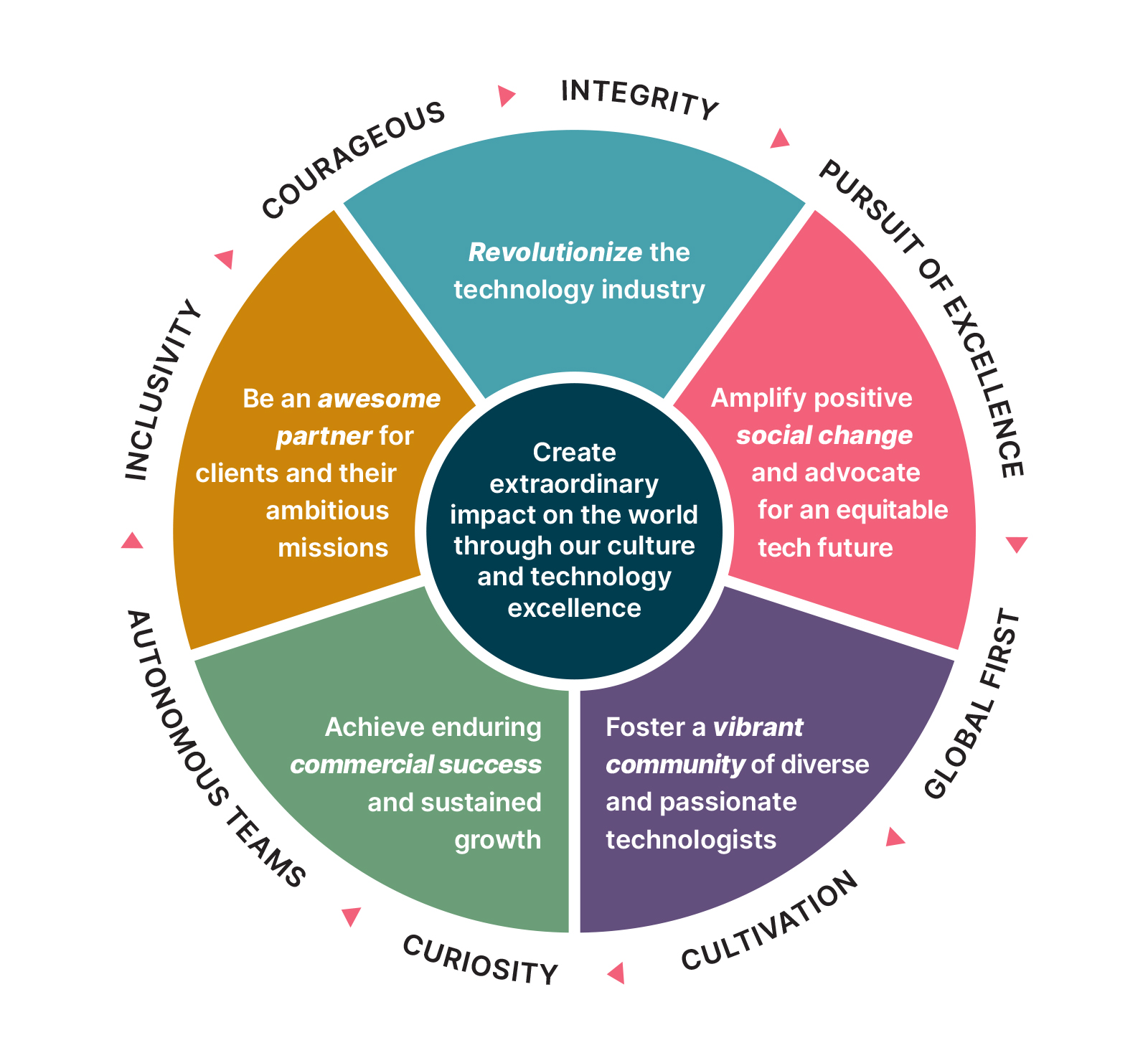
Culture and values
The scale and multi-dimensional nature of social issues like climate change and inequality means they require multiple perspectives and an unwavering commitment to resolve.
In our pursuit of social change, we draw on a culture that encourages us to imagine and implement inventive solutions for seemingly intractable problems. We have cultivated an enterprise that is defined not only by empathy and diversity, but also by radical inclusivity, where people understand they are free to bring and be their authentic selves, advocate fearlessly for causes they believe in, and hold senior leaders accountable.
At Thoughtworks, open dialogue and challenging the status quo are actively encouraged. We use feedback rigorously to improve our own processes, as well as the products we develop. Because our people believe in the potential of our collective impact, they become fierce stewards of this culture and powerful agents of positive transformation.
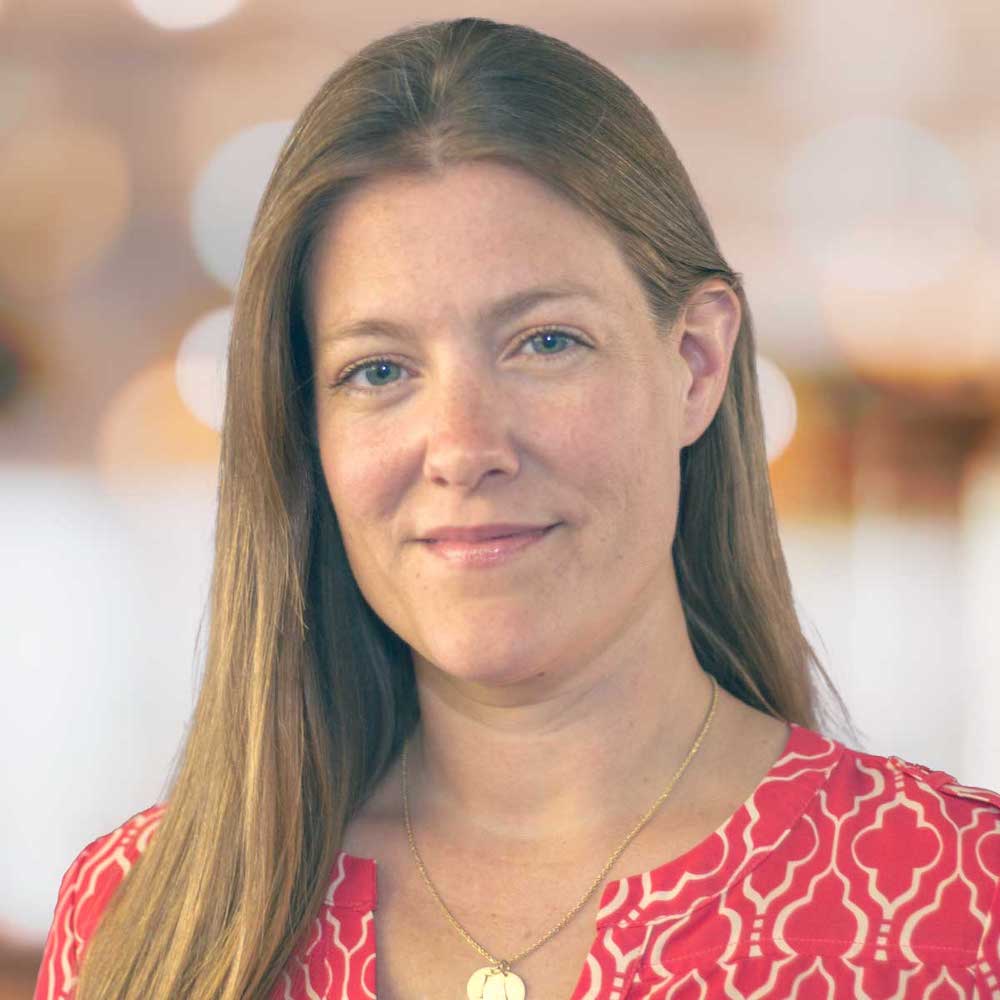
Previously people would have separated their values and the impact they wanted to have on the world from their employer, but now those things are merging. We are able to say, with authenticity and with a track record, that this is something we care about, we have cared about for a long time and invested time and energy in. It’s a genuine differentiator.
Previously people would have separated their values and the impact they wanted to have on the world from their employer, but now those things are merging. We are able to say, with authenticity and with a track record, that this is something we care about, we have cared about for a long time and invested time and energy in. It’s a genuine differentiator.
The way forward: building capabilities and international collaboration
Social change is a process that plays out over years, if not decades. It should be seen as a journey, in which progress is defined by constant efforts to learn and improve.
The Office of Diversity, Equity, Inclusion, Sustainability and Social Change ensures best practices and successes in one region are replicated in others, contributing to our knowledge as an organization
and our ability to best serve the causes we focus on. It assesses all the major initiatives we pursue,
whether impact, business or strategy-related, through the lenses of diversity, equity, inclusion, sustainability and social change.
The Social Impact Framework outlines the levers we have to make systemic social impact. It starts with the individual journey of Thoughtworkers and culminates in our vision to practice responsible technology, striving for social impact that serves the world’s most vulnerable.

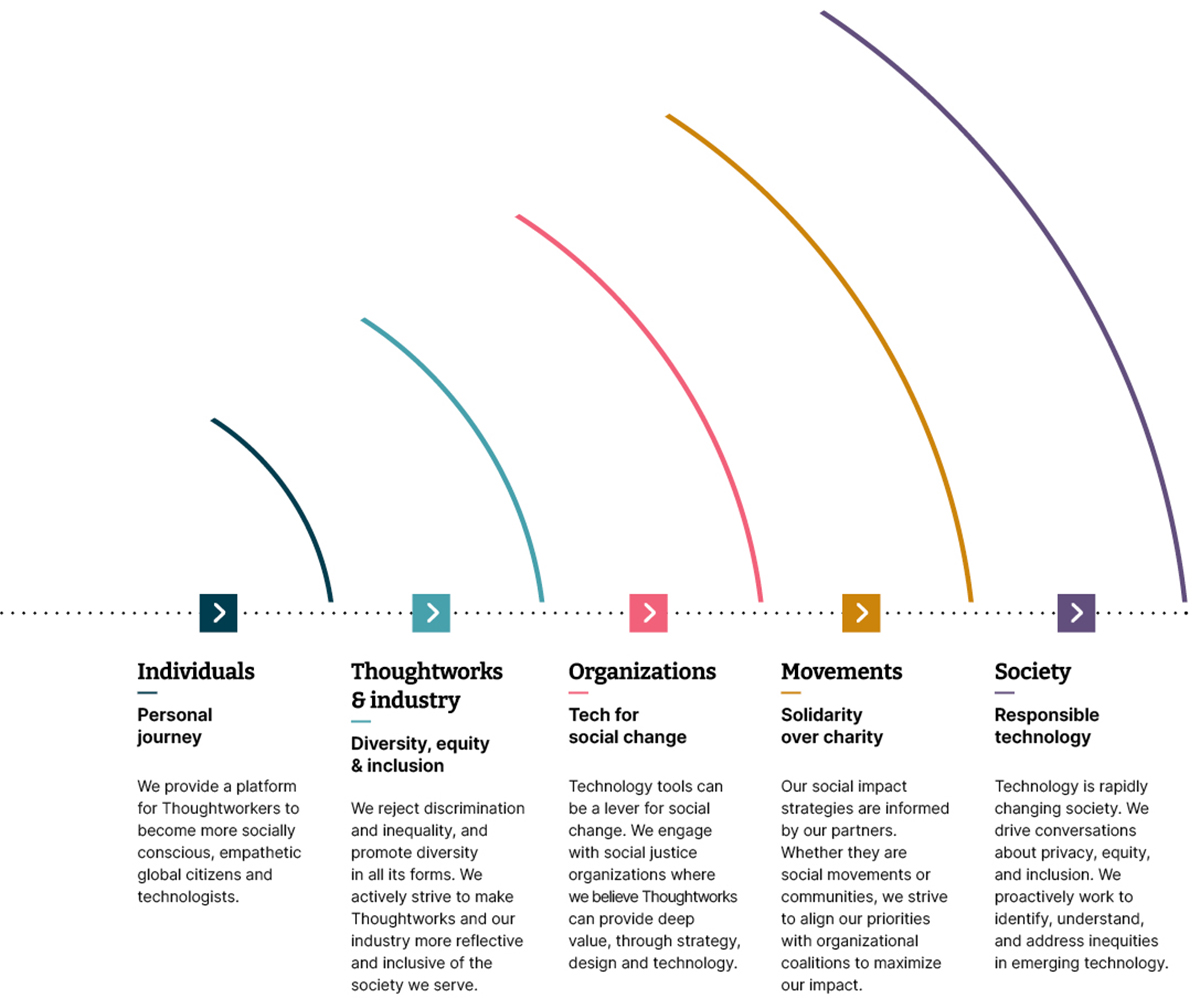
The Office also examines our alignment with frameworks and compacts around these issues globally, such as SASB (Sustainability Accounting Standards Board) Standards and the United Nations Sustainable Development Goals (SDGs).
While we believe in the importance of global ESG frameworks and compacts, our commitment to diversity, equity and inclusion, sustainability and social change is first and foremost driven by our employees and partners. We see global compacts as one lever to organize people globally around common goals, but believe that real social change must be driven by social movements rooted in local communities.
We have been working towards the SDGs with UN partners in multiple ways, on initiatives such as the SustainChain™ platform, to advance sustainability and with UN Women China, to achieve gender equality. The SDGs are an ambitious global blueprint for a better future for all, and a promising framework to organize collective action for meaningful progress.
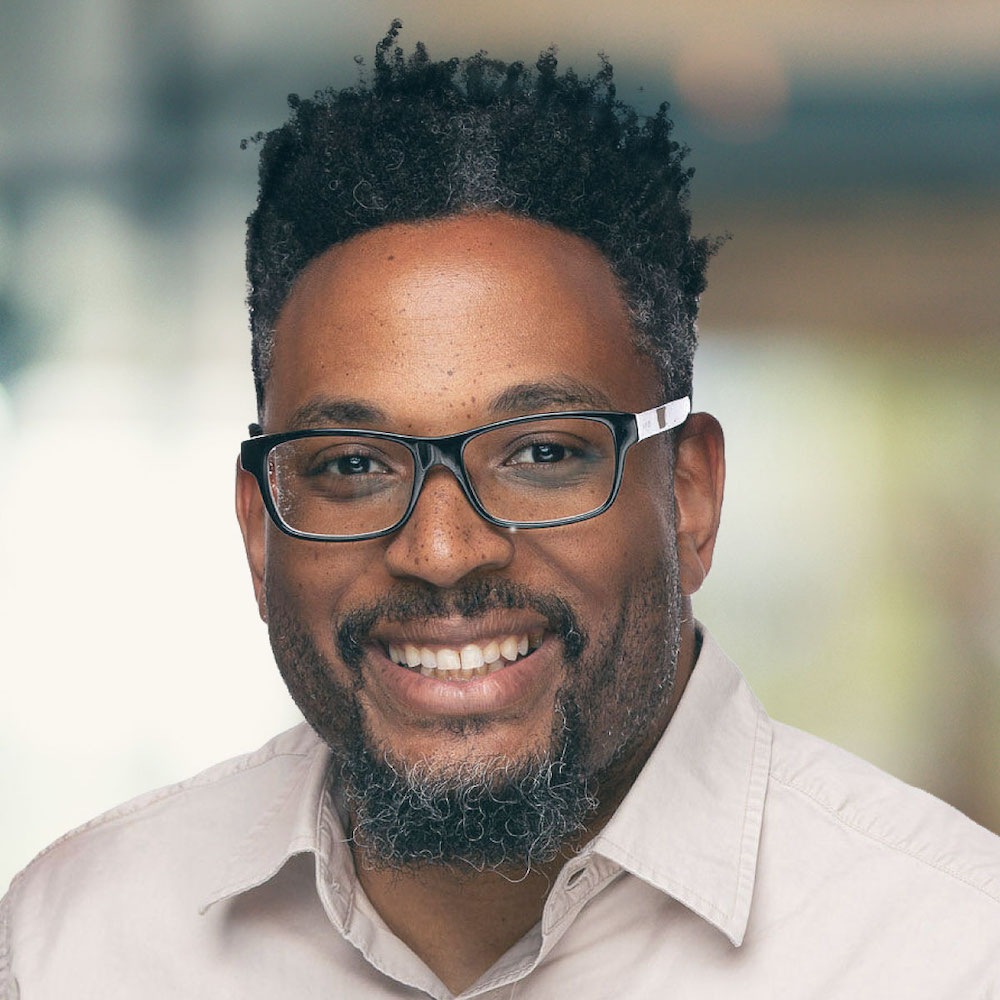
We’ve done meaningful work both in DEI, and in sustainability and social change at the regional level, for a long time. Now, as we build out a global strategy for how we advance our priorities as a company, we’re working to integrate sustainability, social change and DEI into new initiatives, services and norms right from the outset.
We’ve done meaningful work both in DEI, and in sustainability and social change at the regional level, for a long time. Now, as we build out a global strategy for how we advance our priorities as a company, we’re working to integrate sustainability, social change and DEI into new initiatives, services and norms right from the outset.
Beyond corporate social responsibility
Social change and sustainability work remains an integral part of what we do and who we are, rather than an add-on or box-ticking exercise; not just because it is right, but because organizations must center a commitment to social impact in their overall understanding of the impact they have on society. Across our endeavors with other organizations and global coalitions, we use data and best practices drawn from work with clients and our efforts to enhance our own impact.
We believe, however, that impact goes beyond what you can measure. The qualitative and systemic impacts that make a difference are often hard to assign numeric value to — but they are the foundations of lasting change that move us all forward.
Our resolve to pursue growth in a way that considers a wide range of stakeholders, and our ability to provide an environment in which passionate, conscientious and determined people of all kinds can flourish, give us every reason to be optimistic about the future — and our ability to contribute to a better one for the long term.
Social impact report: keep reading

Across the globe, our social impact work spans several focus areas, many of them connected:
Chapter one: Responsible tech and innovation
Ensuring the risks and social implications of tech are adequately evaluated, and embedding the values of privacy, empathy, equity, and inclusion in tech solutions
Chapter two: Beyond diversity in tech
Extending opportunities to all: providing career pathways that increase the representation, and advancement of women and underrepresented groups in the technology sector
Chapter three: Inclusivity and social justice
Using data to shine a light on injustice and using technology to help provide disenfranchised communities platforms for empowerment
Chapter four: Sustainability and climate action
Working to reduce our own carbon footprint, leveraging technology to identify and mitigate the negative impacts of climate change
Chapter five: Healthcare as a human right
Developing technology-based approaches to extend health information and care to communities grappling with health service shortages



















